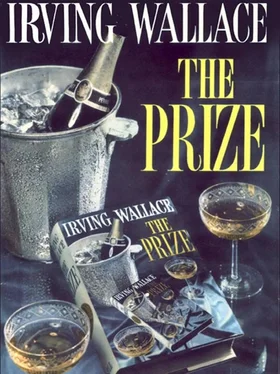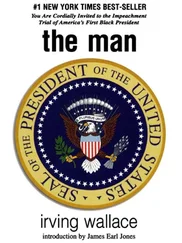Mr. Manker parked the limousine before one of the apartment buildings. For several minutes, he explained the nonprofit evolution of the communal housing unit beside them. When he finished, he inquired, ‘Would you like to visit inside?’
They all left the vehicle, and gathered on the pavement in the gentle sun.
Craig said to Mr. Manker, ‘If you don’t mind, I’ll stay out here and have a smoke. I’ve seen your co-ops before.’
‘As you wish,’ said Mr. Manker.
‘I think I’ll keep Mr. Craig company,’ said Indent Flink.
Mr. Manker herded the others towards the apartment building entrance. Craig watched Emily Stratman as she proceeded on beside her uncle. She was taller than her uncle, and she wore a grey suede jacket and tight blue skirt, cut short, revealing her long legs and the perfect curves of her calves filmed over by sheer nylon. As she walked, her ample buttocks and generous hips moved freely, and Craig realized that she wore no girdle. He had earlier been so absorbed in her virgin face that it now surprised him that her figure could be more feminine and provocative than Lilly’s figure.
Briefly, he made his mental apologies to Lilly, remembering her uninhibited giving, yet the difference was clear. You associated Lilly with health and nature and spontaneous animal sex. You put her against the background of a forest, with the forest sounds and the sky patch above, and you took her at once, without sparring, for carnal pleasure alone, on the earth and grass. But Emily Stratman-you imagined her, and you thought of unblemished maidenhood, reserved and withheld, tensely waiting on one desired, and you thought of love and romance and the long hungry building. You put her in the softly lighted boudoir, with the caressing breeze coming through the open French windows, and the wan moon and the faraway music, and you carried her from the chaise to the canopied bed, and you embraced her and kissed her and touched her unviolated flesh, until at last a low fire burned, and then you took her slowly, ever so slowly, with art and soothing, until the low fire grew to blaze.
Craig shook himself. The incongruity of his fancy, here on a Stockholm pavement, before a co-operative housing structure, struck him fully, and as being ridiculous, and he banished the daydream. Emily and the rest had disappeared into the building. Craig found his brier pipe, packed it, and Indent Flink was waiting with the match.
‘What do you think of our co-operatives?’ asked Flink.
‘I admire them,’ said Craig, drawing on his pipe, ‘as I admire a nation with no slums. I think it’s advanced and a great gift for the majority. But I’m a writer, an individualist, and I suppose I’d rather live in a tent, simply to be alone and not belong and be levelled off, because I prefer ups and downs.’
‘It will interest you that our co-operatives have even got into the writing game,’ said Flink.
‘In what way?’
‘The co-ops publish a magazine, and they publish books at lower cost. They even sponsor a yearly lottery to raise money for maybe three dozen deserving writers.’
‘You mean there’s that much interest in authors here?’
‘Enormous interest,’ said Flink. ‘There are seven million people in Sweden. Sixty-five per cent of all adults are regular book readers.’
‘Remarkable,’ said Craig.
‘Our problem here is the critics. Everything succeeds or fails on the reviews. If they are good, a book becomes a best seller. If they are bad, we can dump our stock in the canals. The Perfect State got unanimous raves. What irked me was that the raves were not only for its literary merit, but, I suspect, because a story of Plato gave the critics a chance, in their articles, to display their own erudition.’
Craig laughed. ‘I suppose that does happen.’
‘I am sure,’ said Flink seriously. ‘It happened with each of your books. The critics used them all to show off themselves. I believe this sometimes influences even the Nobel Committee. Jacobsson was telling me about the contest for the second Nobel literary award in 1902. There were many nominees considered behind closed doors-Anton Chekhov, Thomas Hardy, Henrik Ibsen-but who were the final contenders in the last ballot? Theodor Mommsen, eighty-five years old, with his five-volume History of Rome , and Herbert Spencer, eighty-two, with his ten-volume A System of Synthetic Philosophy . So there they were for the Nobel literary prize, a German historian and an English philosopher-and not Chekhov or Ibsen. Mommsen was elected and given the prize. Why? The Nobel Committee said for his artistry. Compared to Ibsen? For myself, I suspect a prize for Mommsen was an advertising for the Nobel judges, of their own erudition and scholarship. Possibly, this same egotism worked in your favour, too. I don’t know.’
Craig and Flink paced before the co-operative building, discussing publishing and books and public taste, discussing the cynical and morose outlook of Swedish writers (a rebellion against the idyllic welfare state), and the taste of Swedish writers for Faulkner and Kafka and Gottling and their distaste for the valentines of Ingrid Påhl, until, presently, Mr. Manker emerged with his conducted tour.
Leah burst forth towards Craig, taking his arm and attention possessively, and bubbling on about soundproof rooms and stainless steel and garbage-disposal equipment. Feigning a show of interest, Craig covertly sought out Emily Stratman. A quarter of an hour before, he had wished she would turn around so that he might enjoy her fully. Now she was turned around, in his direction, across the lawn. She wore a high-necked pale blue sweater beneath the suede jacket and over the tight skirt. Her bosom, rising and falling slightly-had they climbed stairs or was it the day?-was spectacularly abundant, and Craig was unaccountably pleased as he enjoyed it, and her, in the sun.
They drove on now, with Mr. Manker at his voluble best, fluently reciting capsule histories of this museum and that gallery and endless chapels of worship. On lovely Helgeandsholmen-Holy Ghost Island-he idled the car, and they considered the unlovely, Germanic Riksdagshuset or Parliament Building, and learned that it had been established in 1865, and that the aristocracy had been oppressive (did Count Jacobsson squirm ever so little?) and allowed only ten per cent of the population to vote until after the fall of the Hohenzollerns and Romanovs, so recently, when universal suffrage and true democracy finally came to backward Sweden.
They drove farther through Stockholm-‘a community of twelve islands connected by forty-two bridges’, recited Mr. Manker-until they reached an immense underground garage, known as Katarinaberget, and they were told that this had been specifically constructed as a shelter to protect 20,000 persons against nuclear explosions. Now, for the first time, Craig was fascinated by a projection of the future.
‘We hope that people will take the lesson of your book, Armageddon ,’ said Indent Flink to Craig, ‘but if they don’t, you can see, we are ready to survive.’
‘How many of these have you got?’ asked Craig.
Mr. Manker replied. ‘We now have four of these huge atomic bombproof shelters in Stockholm, to save fifty thousand people, and, in all, nineteen such large ones throughout Sweden, and also thirty thousand small ones, to hold all together over two million people. The rest of the people we could evacuate in minutes from the cities to rural areas. The subterranean shelter you observe here has electricity, heat, water, and food, even preparations for schools. Much of our heavy industry-Bofors and Saab-make their anti-aircraft and jet aeroplanes in subterranean factories carved into granite hills. Other nations only speak of civil defence; we in Sweden have already acted on it.’
Читать дальше












